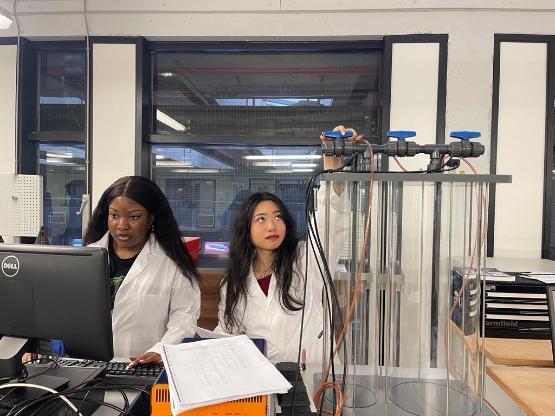International Women and Girls in Science Day

'Due to the gender gap... it is particularly important that we encourage girls and young women to consider STEM related studies' - Dr Elaine Brown
To mark International Women and Girls in Science Day - February 11, 2022 - the University of Bradford spoke to two of its second year chemical engineering students about what inspired them to pursue their studies and hopes for the future.
Patricia Goeyardi, (pictured on the right, above) originally from Bali, Indonesia, is president of the University’s Chemical Engineering Society; she has attended training sessions run by former US vice president Al Gore, and founded the Green Team Indonesia foundation.
She said: “I was interested in science from a young age. I can remember my parents getting me science experiment kits for Christmas. The issue of sustainability is something I have been keenly aware of, especially living in Bali, because it’s an island that most people think of as a holiday destination, but there are also rural areas where people have no electricity.
“For me, these issues are brought into focus here, and I’m particularly interested in making sustainable energy available to people living in those areas. The chemical engineering degree here at Bradford looks at things like the design of power plants, solar panels, and sustainability.
“When I was training with Al Gore, it brought home to me just how bad the situation is, but I believe there is hope. I do think we can change. I also think we need to encourage more females into science subjects, to be part of the solution.”
Chance to change
Lola Olugunwa, who grew up in Dublin, Ireland and moved to Nigeria when she was 14, is also passionate about science, and environmental issues. She acts as secretary to the Chemical Engineering Society.
She said: “We have a big chance to change things for the better. This generation is more aware of environmental issues than any other, and I think if we don’t regulate how we are using the earth’s finite resources, then we will only leave more problems for the next generation.
“Moving to Nigeria allowed me to see some of the problems they have, such as huge landfill sites full of plastic. The solution to problems like that involve things like biodegradable plastics.
“Chemical engineering is all around us, in the products we use and even the food we eat, so there are good employment opportunities. I would definitely advise any woman considering a career in science to just do it.”
Shaping the world
Dr Elaine Brown, a Reader in the Faculty of Engineering and Informatics, said: “Engineers are creative problem solvers, and teams benefit hugely from diversity of perspective when considering ways in which to tackle challenges.
“Due to the gender gap that we currently have in the engineering sector, it is particularly important that we encourage girls and young women to consider STEM related studies which will equip them with the skills necessary to successfully implement their ideas to the benefit of society.
“Our students want to play their part in shaping the world for their own and future generations, and we are proud of their passion for sustainable change.”
